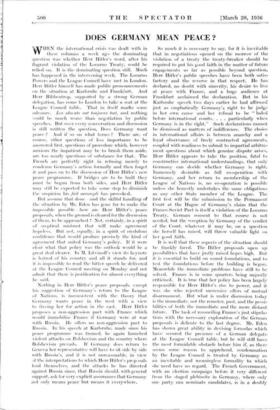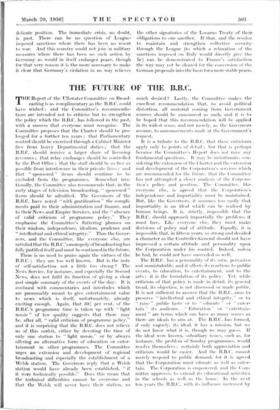DOES GERMANY MEAN PEACE ?
WHEN the international crisis was dealt with in these columns a week ago the dominating question was whether Herr Hitler's word, after his flagrant violation of the Locarno Treaty, could be relied on. It is the dominating question still. Much has happened in the intervening week. The Locarno Powers and the League Council have met in London. Herr Hitler himself has made public pronouncements On the situation at Karlsruhe and Frankfurt. And Herr Ribbentrop, supported by a strong German delegation, has come to London to take a seat at the League Council table. That in itself marks some advance. Les absents ant toujoars tort, and nothing could be much worse than negotiation by public speeches. But over every conversation and discussion is still written the question, Does Germany want peace ? And if so on what terms ? There are, of course, other questions of less importance to be answered first, questions of procedure which, however anxious the impatient may be to brush them aside, are too nearly questions of substance for that. The French are perfectly right in refusing merely to condemn Germany's action formally and then forget it and pass on to the discussion of Herr Hitler's new peace programme. If bridges arc to he built they must be begun from both sides, and Herr Hitler may still be expected to take some step to diminish the suspicion his .fait accompli has provoked.
But assume that done—and the skilful handling of the situation by Mr. Eden has gone far to make the impossible possible—how are Herr Hitler's peace proposals, when the ground is cleared for the discussion of them, to be approached ? Not, certainly, in a spirit of sceptical mistrust that will make agreement hopeless. But not, equally, in a spirit of credulous confidence that would produce precisely the kind of agreement that suited Germany's policy. If it were clear what that policy was the outlook would be a great deal clearer. In M. Litvinoff's view its keynote is hatred of his country and all it stands for, and it is impossible to read the bitter speech he delivered at the League Council meeting on Monday and not admit that there is justification for almost everything he said.
Nothing in Herr Hitler's peace proposals, except his suggestion of Germany's return to the League of Nations, is inconsistent with the theory that Germany wants peace in the west with a view to freeing her for action in the cast. Herr Hitler proposes a non-aggression pact with France which would immobilise France if Germany were at war with Russia. He offers no non-aggression pact to Russia. In his speech at Karlsruhe, made since his peace programme was framed, he again launched violent attacks on Bolshevism and the country where Bolshevism prevails. If Germany does return to Geneva her representative will have to sit side by side with Russia's, and it is not unreasonable, in view of the interpretations to which Herr Hitler's proposals lend themselves, and the attacks he has directed against Russia since, that Russia should, with general support, ask for very explicit assurances that Germany not only means peace but means it everywhere. So much it is necessary to say, for it is inevitable that in negotiations opened on the morrow of- the violation of a treaty the treaty-breaker should be required to put his good faith in the matter of Suture: engagements so far as possible beyond question. Herr Hitler's public speeches have been both satis- factory and the reverse in that respect. He has declared, no doubt with sincerity, his desire to live at peace with France, and a huge audience at Frankfurt acclaimed the declaration. But in his Karlsruhe speech two days earlier he had affirmed just as emphatically Germany's right to be judge in her own cause and her refusal to be " haled before international courts, . . . particularly when Germany is in the right." Such declarations cannot be dismissed as matters of indifference. The choice in international affairs is between anarchy and a loyal observance of freely contracted agreements, coupled with readiness to submit to impartial arbitra- ment questions about which genuine dispute arises. Herr Hitler appears to take the position, fatal to constructive international understandings, that only Germany can decide whether Germany is right. Immensely desirable as full co-operation with Germany, and her return to membership of the League of Nations is, no co-operation is possible unless she honestly undertakes the same obligations as any other State member of the League. The first test will be the submission to the Permanent Court at the Hague of Germany's claim that the Franco-Soviet Pact is itself a violation of the Locarno Treaty. German consent to that course is not needed, but the reception by Germany of the verdict of the Court, whatever it may be, on a question she herself has raised, will throw valuable light on her good faith.
It is well that these aspects of the situation should be frankly faced. The Hitler proposals open up possibilities that have justly raised. hopes high. But it is essential to build on sound foundations, and to test the foundations before the building is begun. Meanwhile the immediate problems have still to be solved. France is in some quarters being unjustly criticised. It is true that her policy has been largely responsible for Herr Hitler's rise to power, and it was she who rejected successive offers of mutual disarmament. But what is under discussion today is the immediate, not the remoter, past, and thc possi- bilities of both the immediate and the more distant future. The task of reconciling France's just stipula- tions with the necessary exploration of the German proposals is delicate to the last degree. Mr. Eden has shown great ability in devising formulas which have secured the presence of a German delegate at the League Council table, but he will still have the most formidable obstacle before him if, as there seems some reason to apprehend, condemnation by the League Council is treated by Germany as an inevitable and meaningless formality to which she need have no regard. The French Government, with an election campaign before it very different from the staged plebiscite in Germany, where only one party can nominate candidates, is in a doubly delicate position. The immediate crisis, no doubt, is past. There can be no viestion of League- imposed sanctions where there has been no resort to war. And this country could not join in military measures where there has been no such action. by Germany as would in itself- endanger peace, though for' that-very reason it is the more necessary to make it clear that Germany's violation in no way relieves the other signatories of the Locarno Treaty of their Obligations to one another.' - If that, and the resolve to maintain and strengthen collective security through the- League (to which a relaxation of the sanctions imposed on Italy would directly give the lie) can be demonstrated to France's satisfaction the way may yet be cleared for the conversion of the German proposals into the basis for a more stable peace.



































































 Previous page
Previous page